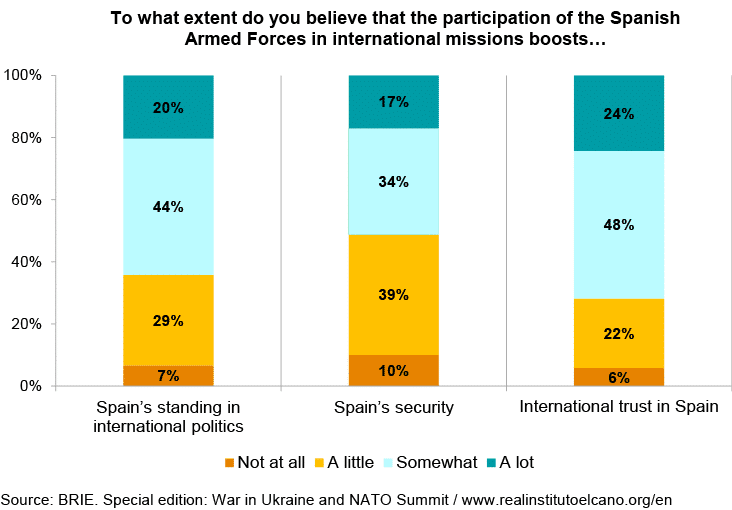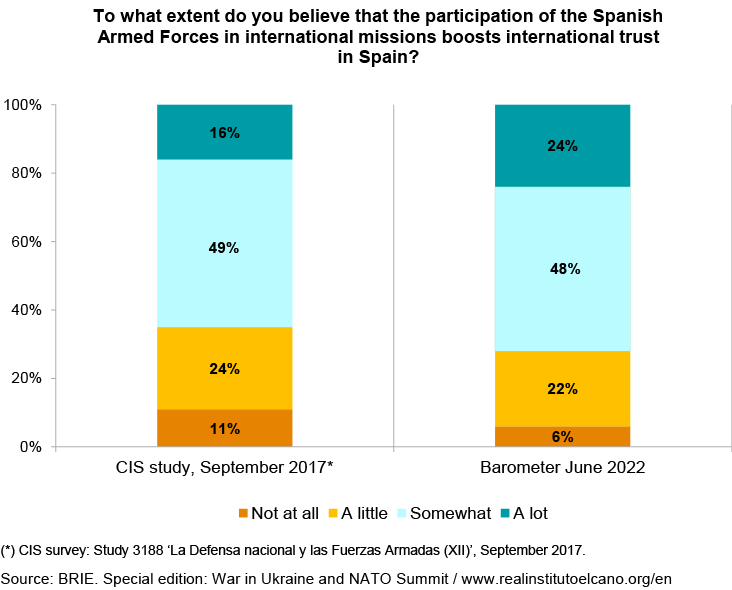Technical data
- 3.2% for p = q = 50% and a significance level of 95% for the sample as a whole
- 7 to 13 June 2022
- IMOP
Highlights
- The war in Ukraine is perceived as the biggest problem facing Europe and as a threat to the security of the continent as a whole.
- Russia is considered to be responsible for the war.
- The Spanish public strongly believes Ukraine will not recover Crimea and part of the Donbas and that there should be negotiations with Russia to end the war, even if it means the loss of these territories, which have been controlled by Russia since 2014.
- Spain is believed to be in danger as a result of the war. The main danger is economic, although there are also concerns about national security.
- There has been a slight rise in support for Spain’s membership of NATO. Support is almost unanimous among the right and the centre and stands at two-thirds among the left.
- The US has not recovered its standing after the Trump Presidency. Opinion is divided on whether Europe should pursue greater autonomy on defence or whether it should continue or even strengthen military cooperation with the US.
- There has been a rise in support for European spending on defence.
- The number of people in Spain with a highly favourable opinion of the Armed Forces has doubled. Recognition of their contribution to the country’s standing through their participation in international missions has also risen.
War in Ukraine: Europe’s number-one problem
In Spain, the war in Ukraine is perceived as the biggest problem facing Europe, far ahead of the other possible answers to this question. Fuel prices come second. These issues appear to have displaced the COVID-19 pandemic from people’s top concerns, alongside climate change and electricity prices. Concern about the war in Ukraine increases substantially with age and is significantly higher among people over 55.
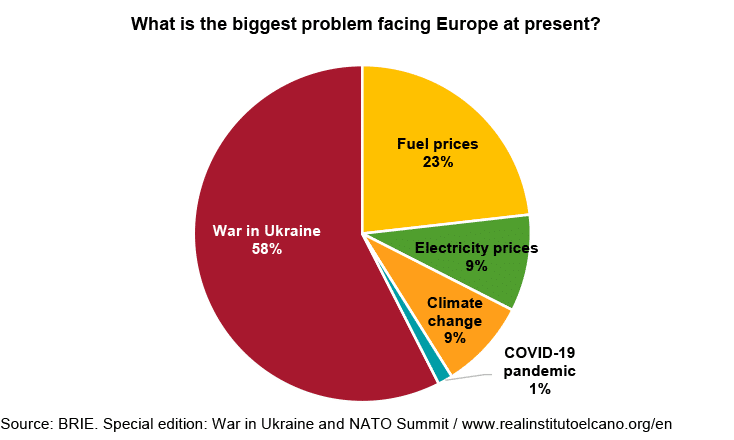
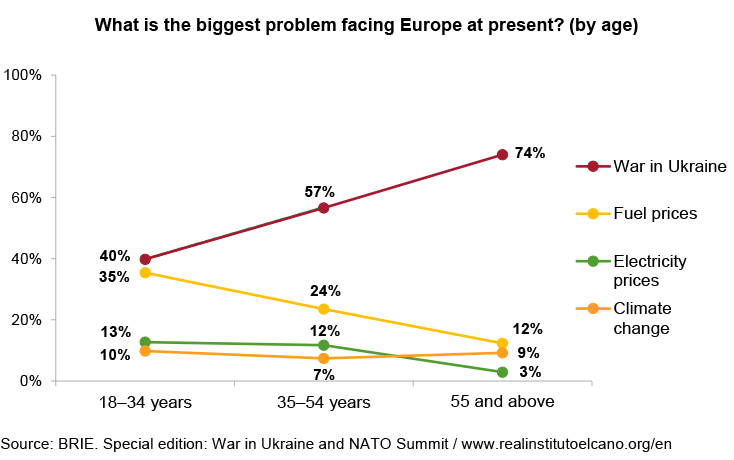
A sharp deterioration in perceptions of Russia
The invasion of Ukraine has dramatically affected the Spanish public’s perceptions of Russia. While the country has traditionally scored low (in both absolute and comparative terms), it has now fallen below China and Morocco, which are traditionally far down the ranking.
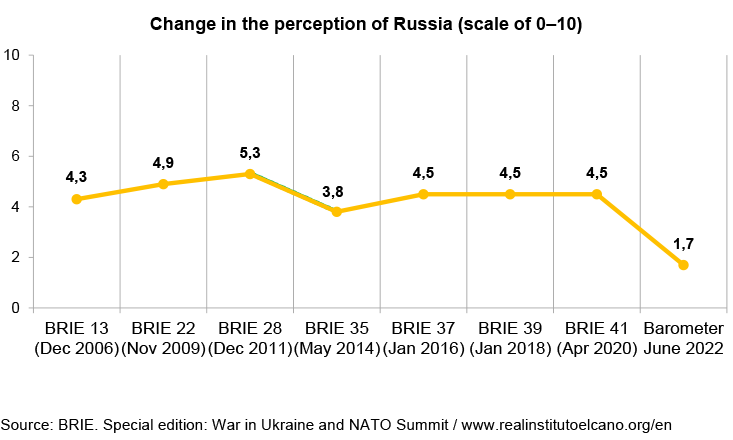
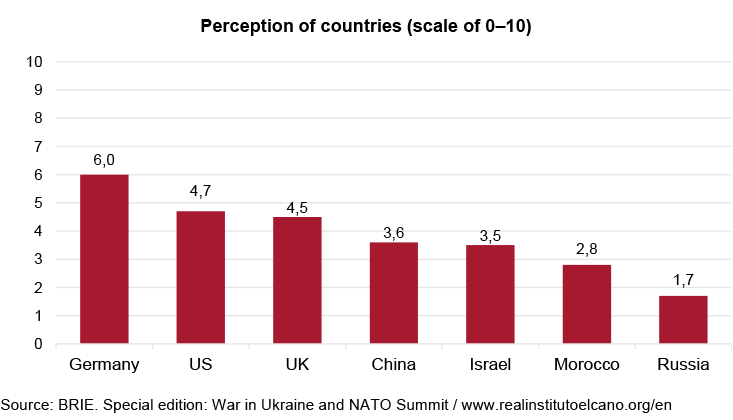
The standing of the US remains damaged
In Spain, perceptions of the US suffered as a result of the election of Donald Trump and his track record during his four-year presidency. The US has yet to recover its previous standing in Spain. This is reflected by a preventive attitude towards the country’s international influence in general and on Spain in particular. While most people believe the US is a sound ally, 40% believe Spain should protect itself from US influence. Political orientation plays an important role, with levels of trust in the US much higher on the right than on the left.
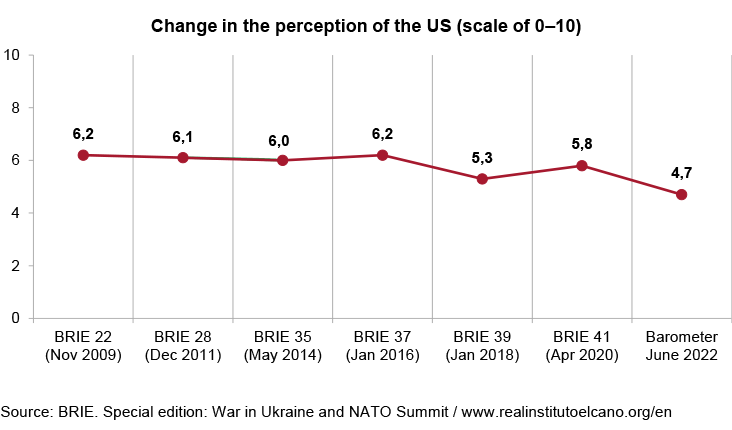
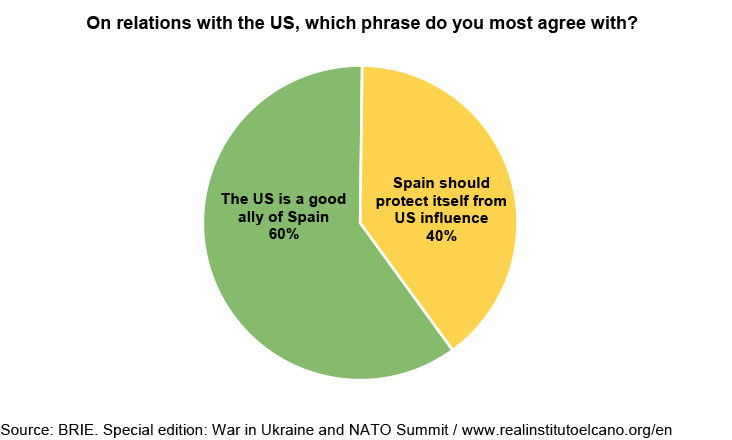
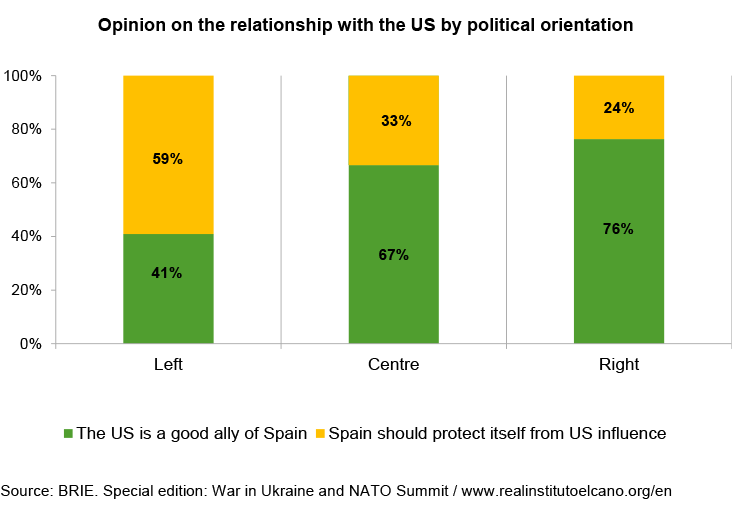
Opinion is divided on Europe, particularly on military cooperation: half of respondents favoured Europe increasing its strategic autonomy on defence with respect to the US; a quarter favour closer ties; and a further quarter believe the current situation is acceptable. Again, there were significant differences by political orientation.
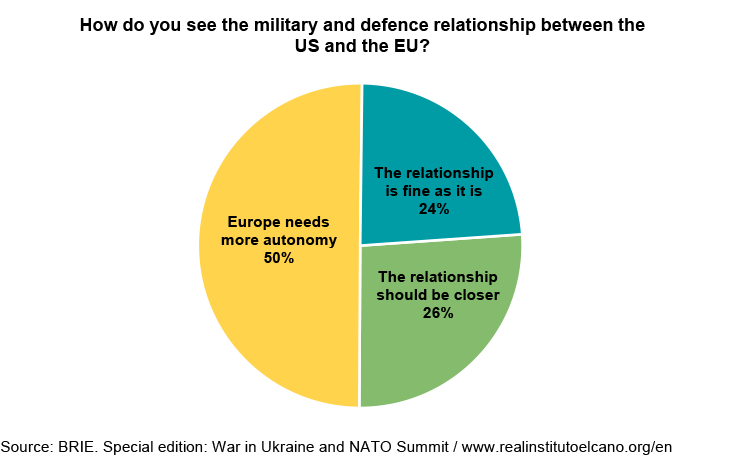
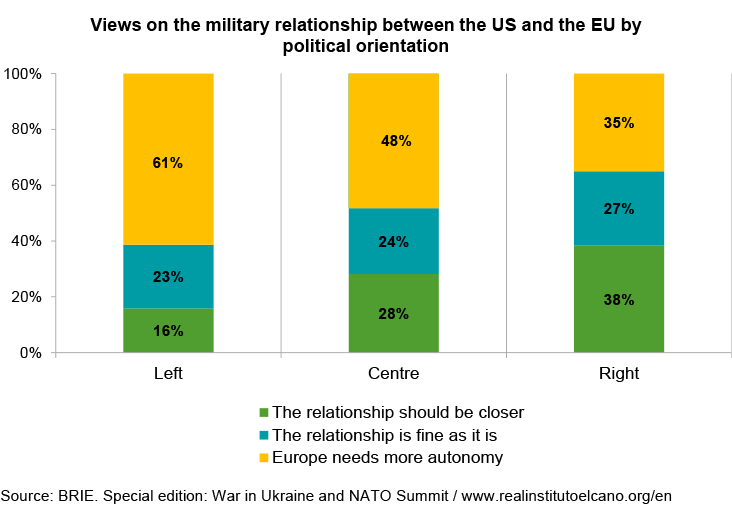
A key aspect of the US–Spain relationship is the use of the Rota and Morón de la Frontera bases by the US. Just over half of respondents agree with this use, compared with 22% against. There are significant differences across the country, with Catalonia and the Basque Country more divided on the issue. There has been a sharp fall in people opposed to the use of the bases by the US (from 37% to 22%), many of whom are now undecided. This could be explained by US participation in the war in Ukraine through NATO.
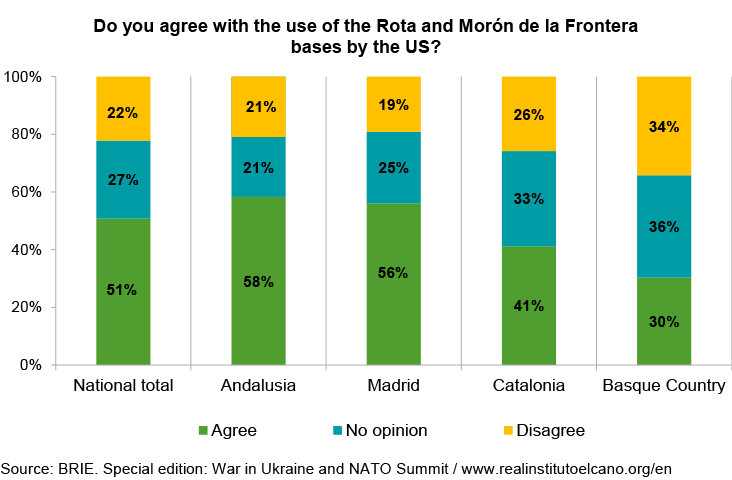
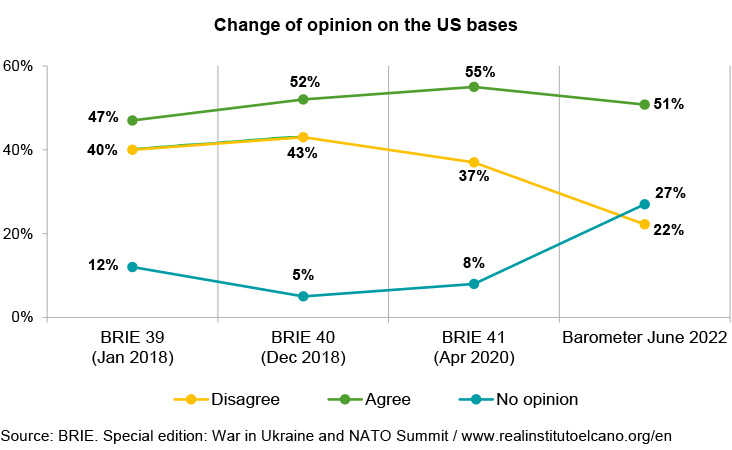
NATO, threats and European military spending
Spanish public opinion on NATO largely depends on political orientation. This distribution contrasts with much greater uniformity of opinions on the UN, the EU and the World Health Organisation. However, the division is even higher for the International Monetary Fund, the only one of the five organisations without overall approval, with significant variance in opinions across the political spectrum.
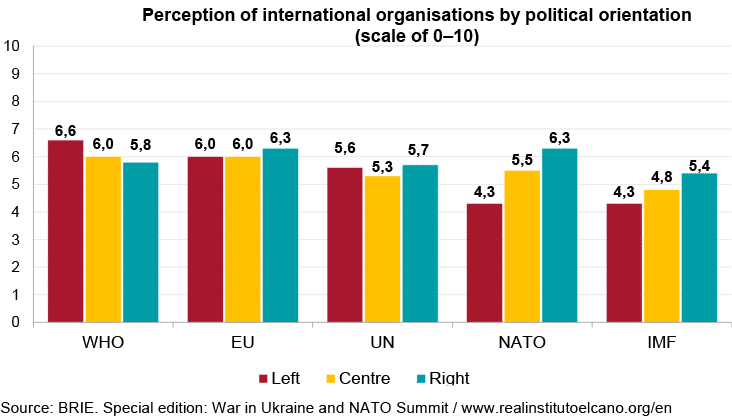
Support for Spain’s membership of NATO has risen slightly among the Spanish public and remains closely linked to political preferences. While there is a majority in favour in the three main groups (left, centre and right) support is much higher in the centre and on the right.
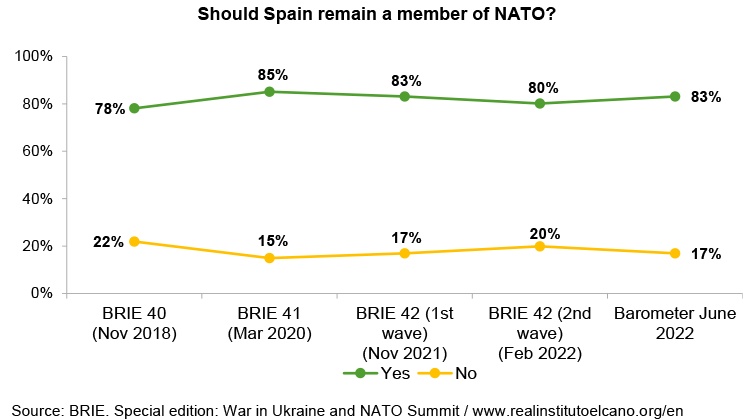
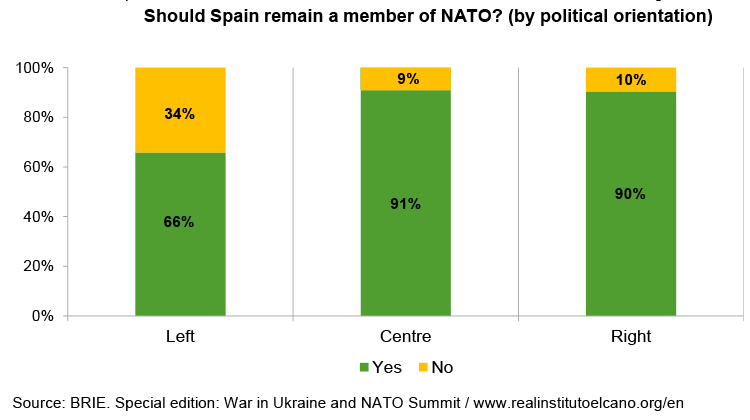
Three-quarters of respondents (76%) believe membership of NATO has boosted Spain’s security in the face of possible external threats. Since Russia began its moves on Ukraine, there has been a marked shift in the perception of the threats against which NATO offers protection for Spain. Since November 2021 the frequency with which Russia is mentioned has increased by a factor of 10, from 5% to 52%. This result should be understood in light of another finding, discussed below: 46% of respondents believe it is either likely (41%) or highly likely (5%) that there will be Russian military action against Spain as a result of the war in Ukraine.
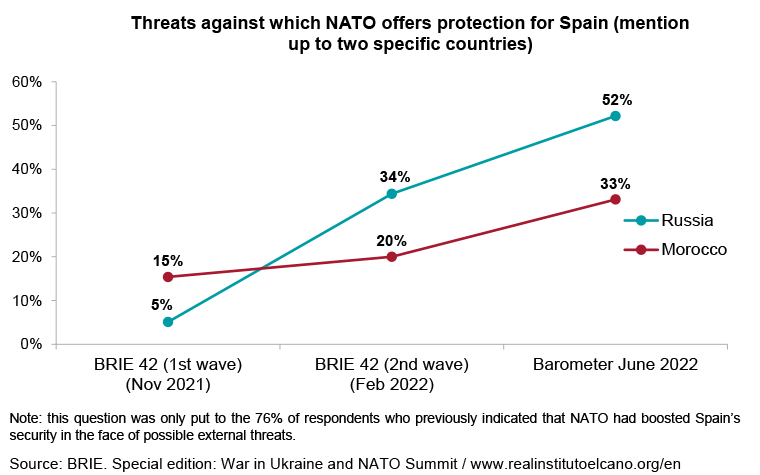
Over half of respondents were aware of the NATO summit that will be held in Madrid (significantly higher among older people), with 70% of this group believing the war in Ukraine makes the summit even more important.
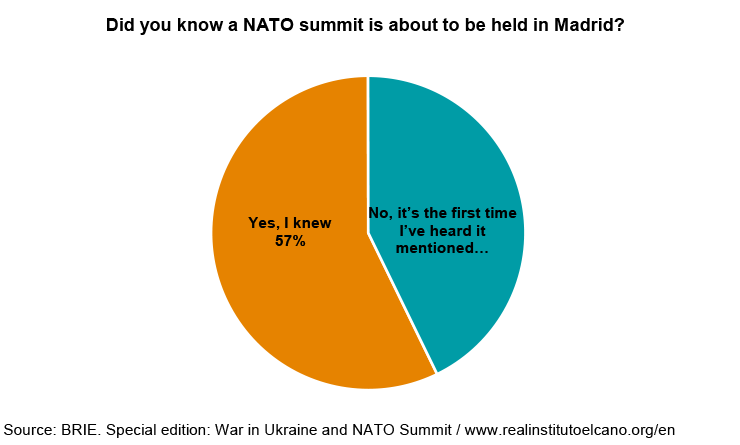
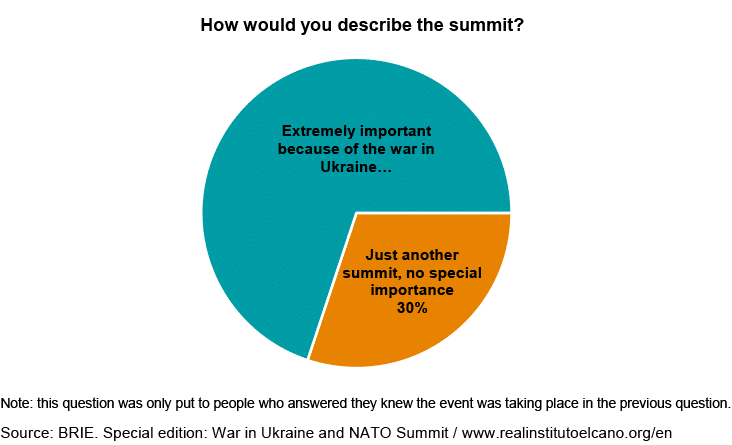
Support for European military and defence spending has risen in the context of current concerns about the invasion of Ukraine. The number of people who agree or strongly agree spending should be increased has risen from 39% in 2018 to 52% at present.
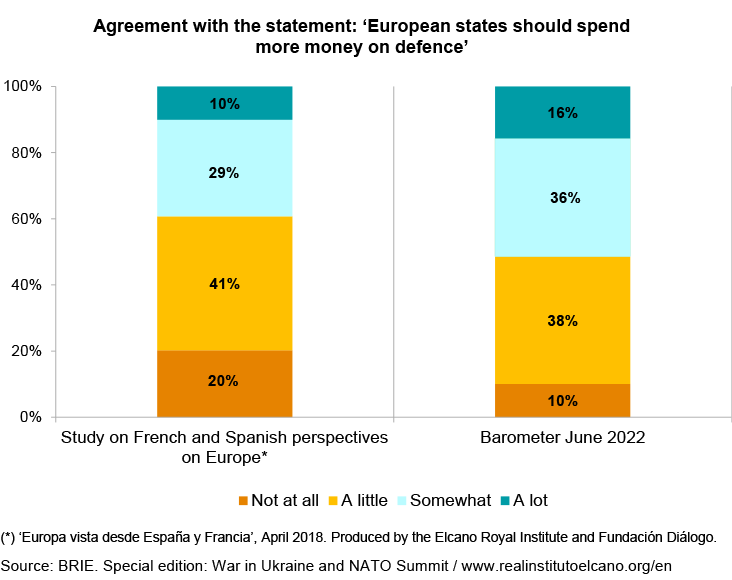
The war in Ukraine
The vast majority of the Spanish public believe that Russia is to blame for the war. Only 15% believe that Russia’s response was provoked by NATO and its expansion towards its borders. This level is the same at both ends of the political spectrum, on both the left and the right, with a slight difference among those in the centre.
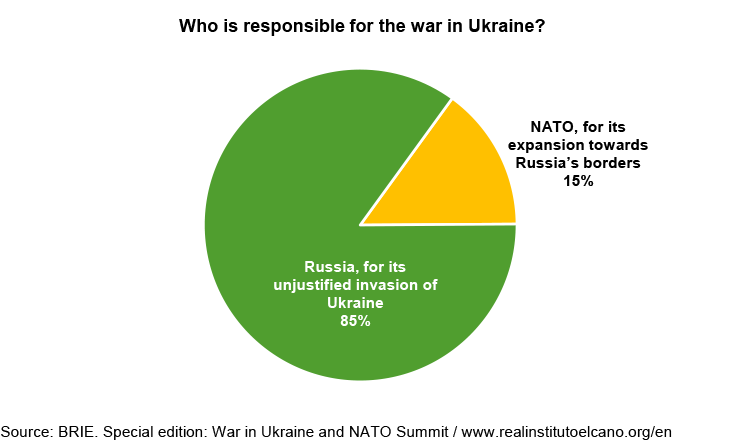
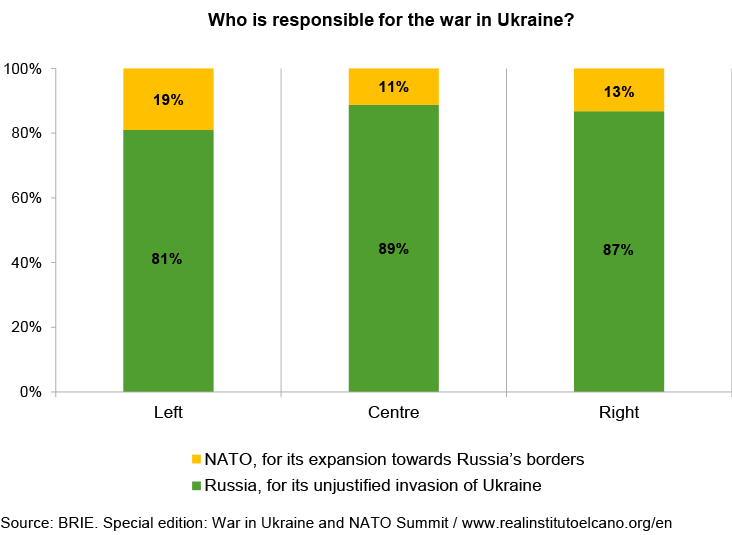
In terms of the future outlook for the war, the vast majority believe Russia will not strip Ukraine of its independence but that it will retain control of the territory it has held since 2014 (essentially Crimea and part of the Donbas). Only a small minority (6%) believe Ukraine will recover control of all its territory, while 8% believe Russia will win the war and strip Ukraine of its independence.
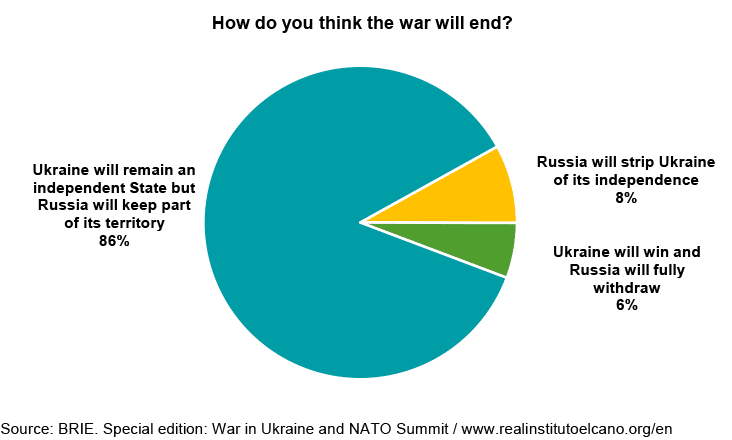
Half of respondents believe the war will continue for between six months and a year. Only an optimistic minority see an end within six months, while one-third believe it will go on for more than a year.
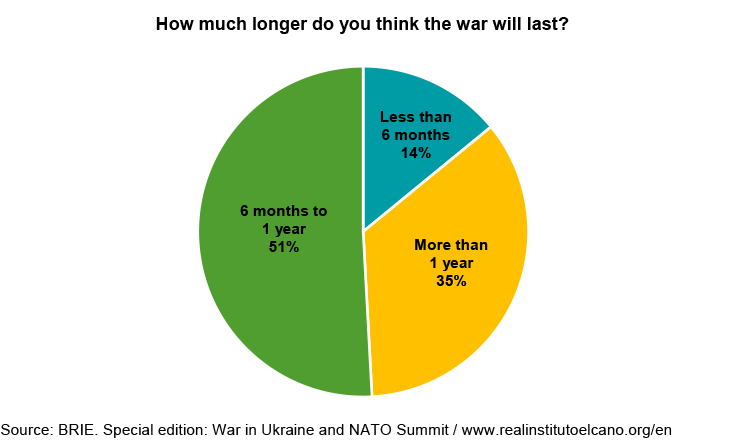
More than three-quarters of the Spanish public believe the war is a threat to Europe as a whole, as opposed to only Ukraine or the countries of Eastern Europe. Women are particularly concerned about the threat to Europe as a whole.
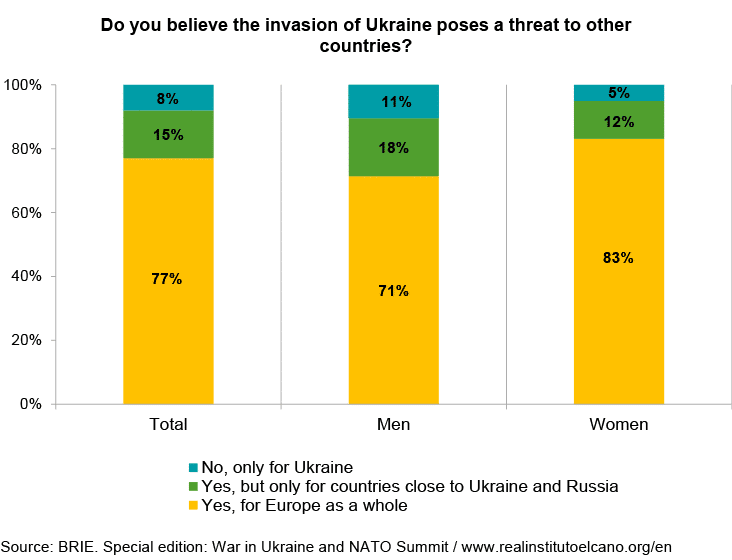
The vast majority also believe the war is a danger to Spain (particularly women).
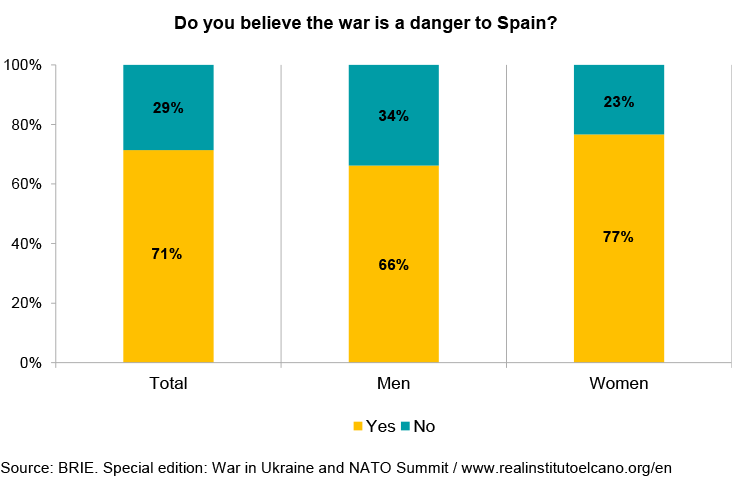
In terms of the specific risks to Spain, there is broad agreement on the economic fallout from the war and almost half of respondents (46%) believe it is likely or highly likely there will be military action against Spanish territory. The majority fear Russia will attack other NATO countries, forcing Spain to intervene.
Note: this question was only put to people who answered yes to the previous question about the war being a danger to Spain.
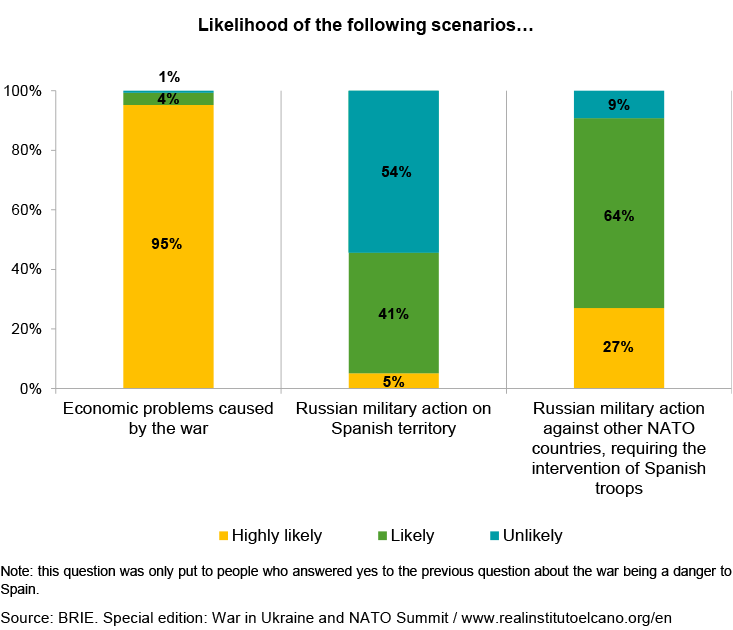
The vast majority of respondents (84%) agree with either maintaining (69%) or even increasing (15%) Spain’s current troop deployment in countries neighbouring Russia or Ukraine, while only 16% are in favour of reducing the country’s presence or of withdrawing altogether.
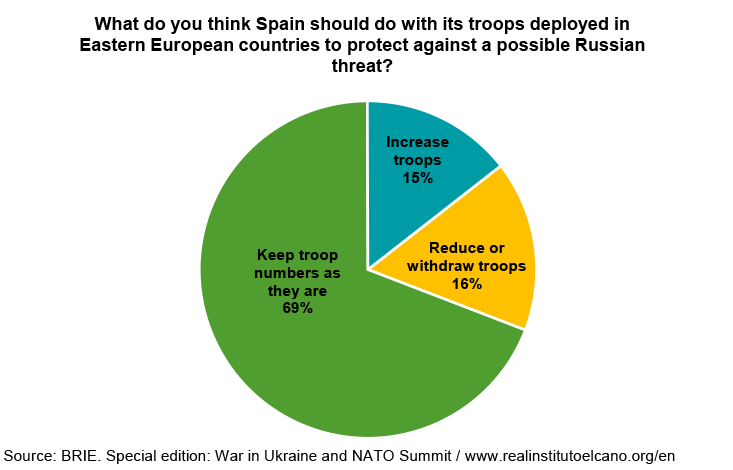
The Spanish public is largely in favour (80% but with significant differences on the left) of continuing to provide support to Ukrainian troops ‘for as long as fighting continues’ as part of the intervention of Western powers in the war. However, a majority (62%) favour negotiating with Russia, even if this means the country retaining control of Crimea and part of the Donbas (also with significant differences). The logic behind this apparent contradiction is that most people in Spain are convinced that Ukraine will not succeed in recovering Crimea and believe the country should negotiate with Russia to bring an end to the war, even if it means losing the territory controlled by Russia since 2014.
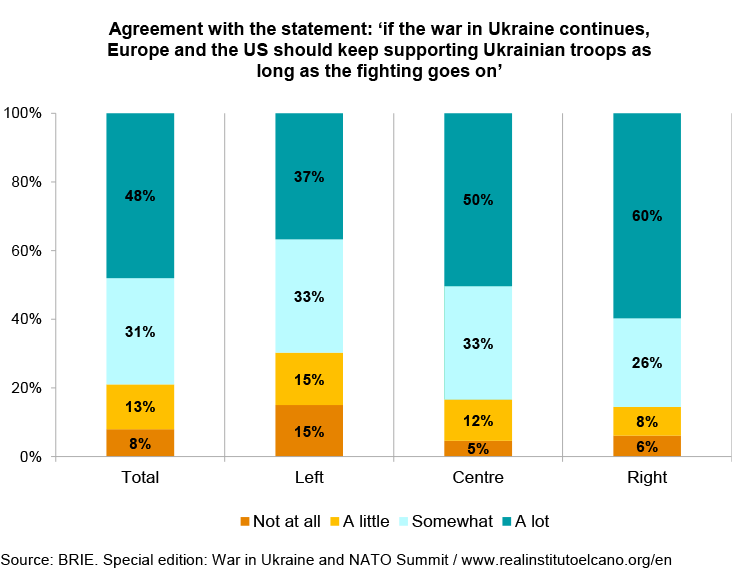

Perception of the Spanish Armed Forces
Spain’s Armed Forces systematically rank as one of the country’s most prestigious institutions in surveys by the Centre for Sociological Research (Centro de Investigaciones Sociológicas, CIS) and in various Elcano Royal Institute barometers. We have repeated a number of questions from the most recent CIS study on national defence and the armed forces in 2017. The percentage of people with a ‘highly favourable’ opinion of the Armed Forces has doubled. While the proportions of favourable and unfavourable opinions are largely similar, the last five years have seen a shift from favourable to highly favourable, reflecting a growing enthusiasm.
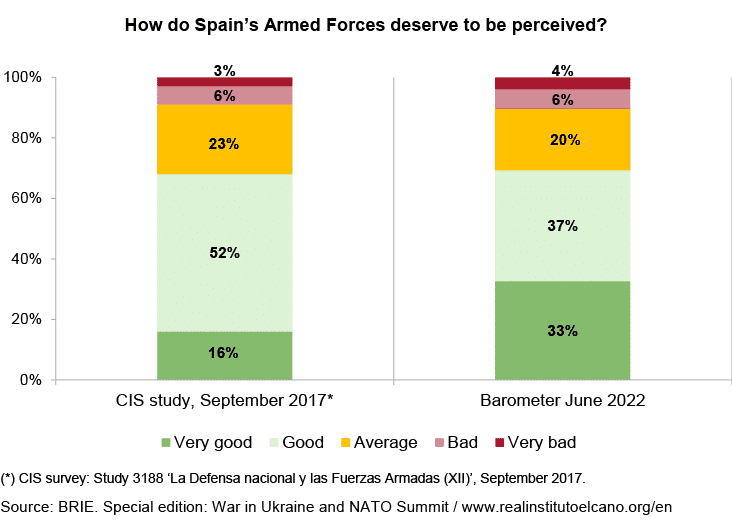
Participation of Spain’s Armed Forces in international missions is viewed as highly positive for Spain’s standing in international politics and for international trust in the country. Opinion is more divided when it comes to the country’s security. Between 2017 and 2022 there has been a significant rise in people who believe participation makes a positive contribution to international trust in Spain.
